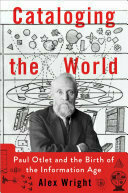
"In 1934, a Belgian entrepreneur named Paul Otlet sketched out plans for a worldwide network of computers--or "electric telescopes," as he called them -- that would allow people anywhere in the world to search and browse through millions of books, newspapers, photographs, films and sound recordings, all linked together in what he termed a râeseau mondial: a "worldwide web." Today, Otlet and his visionary proto-Internet have been all but forgotten, thanks to a series of historical misfortunes -- not leastof which involved the Nazis marching into Brussels and destroying most of his life's work. In the years since Otlet's death, however, the world has witnessed the emergence of a global network that has proved him right about the possibilities -- and the perils -- of networked information. In The Web that Wasn't, Alex Wright brings to light the forgotten genius of Paul Otlet, an introverted librarian who harbored a bookworm's dream to organize all the world's information. Recognizing the limitations of traditional libraries and archives, Otlet began to imagine a radically new way of organizing information, and undertook his life's great work: a universal bibliography of all the world's published knowledge that ultimately totaled more than 12 millionindividual entries. That effort eventually evolved into the Mundaneum, a vast "city of knowledge" that opened its doors to the public in 1921 to widespread attention. Like many ambitious dreams, however, Otlet's eventually faltered, a victim to technological constraints and political upheaval in Europe on the eve of World War II. "--